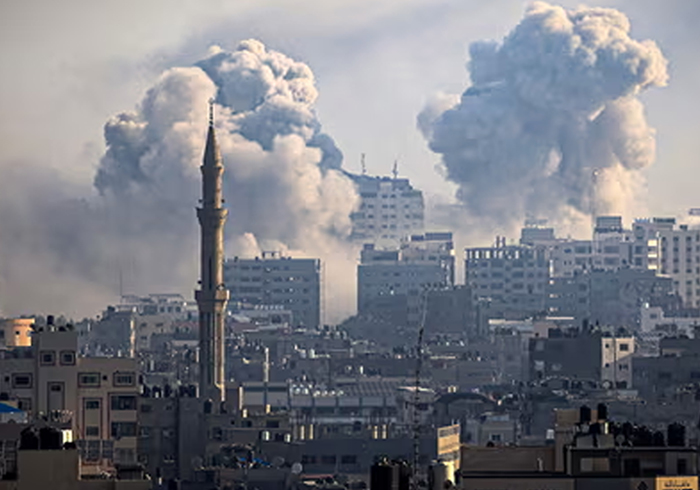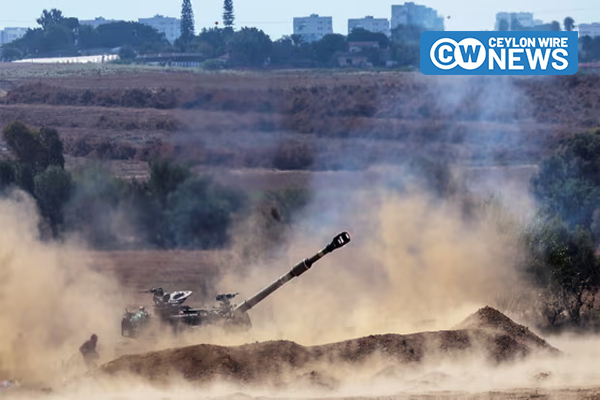Israel has said there will be no humanitarian break to its siege of the Gaza Strip until all its hostages are freed, amid growing concern over dwindling water, food and fuel supplies after a fifth night of bombardment.
The energy minister, Israel Katz, wrote on social media that no “electrical switch will be turned on, no water hydrant will be opened and no fuel truck will enter” until the “abductees” are free.
Israel is preparing to launch a ground invasion in response to bloody massacres carried out in 20 Israeli communities by the Palestinian Islamist group Hamas last weekend, during which dozens of hostages were also seized.
Israel Defence Forces strikes killed 33 people within two hours overnight on Thursday, according to Al Jazeera’s local reporter, bringing the death toll in Gaza to 1,200. The reporter said fighter jets attacked houses in several areas, and civil defence groups recovered the bodies of the dead.

According to the report, since the fighting began, six neighbourhoods in the strip have been destroyed. Eighteen healthcare facilities and 20 ambulances have been affected and 11 healthcare workers killed, the World Health Organization said, in the most intense bombing campaign the strip has suffered in the 16 years since Hamas seized control of the tiny, overcrowded area, home to 2.3 million people.
The UN said late on Wednesday the number of people displaced by the airstrikes had soared 30% within 24 hours to 339,000 – two-thirds of them crowding into UN schools.
Palestinian media said that bombing had killed the brother of Mohammed Deif, Hamas’s military commander, and a senior commander from Palestinian Islamic Jihad.
Hazem Balousha, the Guardian’s reporter in Gaza, reached by phone this morning, said the strip’s residents have been told that hospitals have stopped admitting all but emergency cases. Rafah, Gaza’s crossing point with Egypt, remains closed, and the only power station ran out of fuel on Tuesday, leaving the strip powered by scattered private generators. Those will shut off as well if fuel is not allowed in.

In Israel, the death toll has climbed to 1,200. Lt Col Richard Hecht, an Israeli military spokesperson, told reporters on Thursday that forces are preparing for a ground assault but that the political leadership has not yet ordered one. The prime minister, Benjamin Netanyahu, has vowed to “crush and destroy” Hamas. He leads a newly formed unity government and war cabinet, including members of the opposition.
“We are all in this together. We are all enlisting. This is not a political partnership, but rather a unity of fate. This is the time to close ranks and to win,” said Benny Gantz, the leader of the centrist National Unity party and a strident critic of Netanyahu’s current far-right government.

The US secretary of state, Antony Blinken, landed in Tel Aviv on Thursday as part of a Middle East tour to show Washington’s solidarity with Israel, after a first plane loaded with US munitions arrived in Israel on Wednesday night. His arrival is expected to coincide with the arrival of a US aircraft carrier in the region, amid fears that the events of the last week could escalate, drawing in Hezbollah, the Lebanese militant group, and Palestinian factions in the occupied West Bank and the restive city of Jerusalem.
Gen Michael Kurilla, commander of US Central Command, said: “The arrival of these highly capable forces to the region is a strong signal of deterrence should any actor hostile to Israel consider trying to take advantage of this situation.”
The emergency war cabinet must decide now what the country’s strategic objectives will be in Gaza. A ground offensive, the first since a seven-week war in 2014, is likely to bring even higher casualties on both sides in brutal house-to-house fighting. Israel has mobilised an unprecedented 360,000 reservists, massed additional forces near the strip, and evacuated tens of thousands of residents from nearby communities.
Overnight, fighting continued on Israeli soil on the Gaza periphery, as the IDF struggles to secure the breached security fence the country had relied on to contain Hamas.
Strategic planning has been complicated by the presence of Israeli hostages, among them children and elderly people, inside the Gaza Strip.
Israel’s Army Radio, citing a foreign diplomat, said that those kidnapped had been spread out across the enclave, some being held in private houses, and the factions themselves were not sure of the total number of hostages. Israeli media has put the figure at between 100 and 150.
Keren Shem, whose daughter Mia has been missing since she attended a rave in Re’im kibbutz, where 260 people were murdered, told the station this morning that no government officials have yet been in contact with her.
“I demand that the decision-makers drop everything now and ask for and demand an orderly list of the missing people, with names. Because my daughter may have bled to death – I don’t know. I demand to know,” said Shem.
“Is my daughter on the list, and how do I make contact and what do I do? I’ve done everything I can to inform [the authorities] that my girl is missing. Nobody has reached out to me.”
Source – The Guardian









